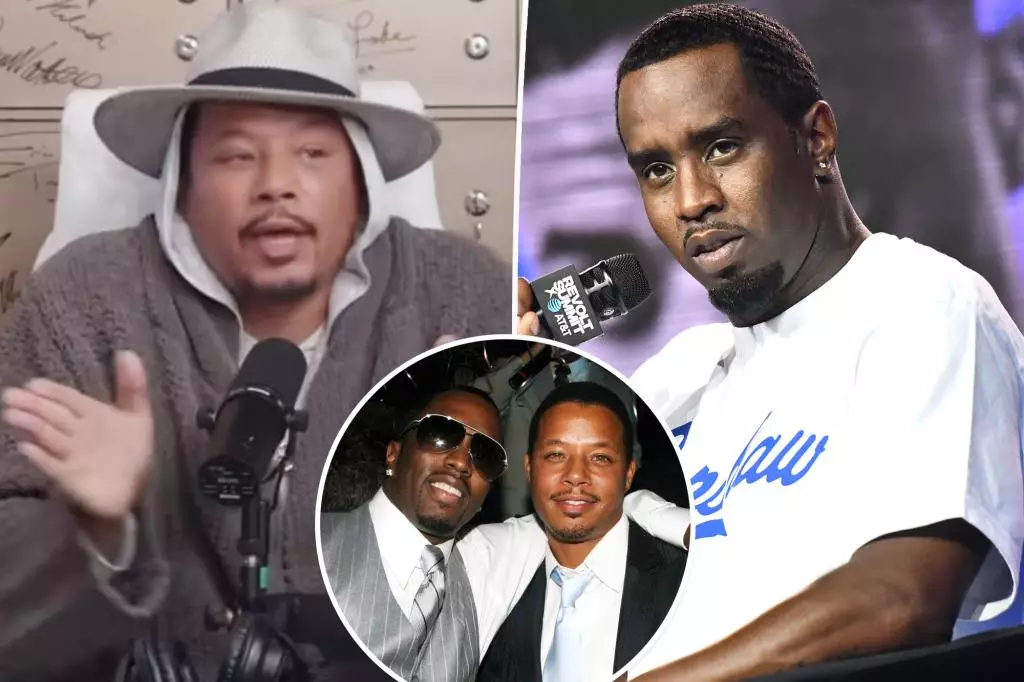In a candid revelation during a recent episode of the “PBD Podcast,” actor Terrence Howard disclosed his troubling interactions with Sean “Diddy” Combs, who is currently embroiled in serious legal controversies, including federal sex trafficking charges. Howard, famed for his role in “Hustle & Flow,” shared that Diddy had persistently sought his company under the guise of wanting acting lessons. However, as Howard describes, these meetings devolved into tension, where Diddy’s demeanor became unsettlingly ambiguous, prompting Howard to question his own safety and dignity.
Howard recounted that during their meetings, Diddy would simply sit and watch him for prolonged periods, a situation that he found perplexing and disconcerting. It wasn’t until his assistant suggested that Diddy’s intentions might be inappropriate that Howard decided to cut ties altogether. The actor’s narrative peeled back the layers of their alleged encounters, revealing not just his discomfort but a broader implication regarding the predatory behavior often faced by men in positions of power.
Confronting Masculinity in the Industry
The aftermath of Howard’s experiences dug deep into discussions surrounding masculinity in Hollywood and the pressures that some actors face. Howard expressed a resolute stance against compromising his masculinity, emphasizing that he is unwilling to participate in roles or behaviors that may challenge his identity. This highlights the paradox of masculinity within the industry, where vulnerability is often shunned, prompting some individuals to resort to intimidation to stand their ground.
His statements raise questions about the environment in which many actors operate, where the specter of sexual coercion often looms large. Howard’s declaration that he had to “threaten to punch” aggressive producers signals a violent undercurrent to the often glamorous facade of Hollywood. It’s a troubling reality that perhaps reflects the pervasive culture of silence and fear that enables such behavior to thrive unchecked.
The Broader Context of Diddy’s Allegations
While Howard’s claims are startling, they are situated within a troubling narrative surrounding Diddy, who is presently facing multiple allegations, including accusations of sex trafficking from various accusers. Joseph Manzaro, among others, has come forth, alleging not just misconduct but systemic abuse within Diddy’s sphere. The juxtaposition of Howard’s personal experience against the backdrop of these broader allegations paints a pretty grim picture.
Combs has outright denied all of these accusations, characterizing them as malicious attempts to gain attention and financial gain. His legal battles loom heavily as he awaits trial while attempting to maintain a public persona. However, Howard’s testimony marks a significant escalation in the allegations against Combs, as he stands as the first major celebrity to claim that Diddy made inappropriate advances toward him directly.
The implications of Howard’s testimony cannot be understated, as it adds a complex layer to the narrative surrounding Combs, who has been a prominent figure in the music industry for decades. As the allegations mount, public perception may shift dramatically in response to the burgeoning accusations and the testimonies of those who once revered him.
The Impact on Industry Relationships
What makes this situation even more intricate is the evolving nature of industry relationships and the weight of personal reputations. Many in Hollywood might feel unwelcome to speak up due to fears of professional backlash, resulting in a culture where abuses of power can flourish. The case brings forward discussions about accountability among high-profile figures, especially when victims are often powerless in the face of overwhelming public and corporate forces.
Seemingly innocuous decisions, such as banning a performer from a television show over music rights— as Combs did with Quincy Brown—elevate the issue of control and dominance within personal and professional realms. The incidents regarding Combs and Howard highlight how personal gain and power dynamics can derail creative partnerships, leading to fractures in the fabric of professional relationships.
The Revelatory Nature of Allegations
Terrence Howard’s experience serves as a stark reminder of the ongoing battle against systemic abuse within the entertainment industry. His decision to speak out signals a potential shift, as more individuals may feel empowered to share their experiences. In many ways, Howard reflects a broader movement against silence and fear—a movement that aims to bring light to the shadows that once thrived unchallenged.
As both the public and industry insiders digest these developments, it remains to be seen how Diddy’s narrative will evolve in light of these allegations. What is becoming increasingly clear is that the cultural landscape of Hollywood is shifting, with greater scrutiny on the power dynamics that have long governed relationships within this glittering but dangerous world.

